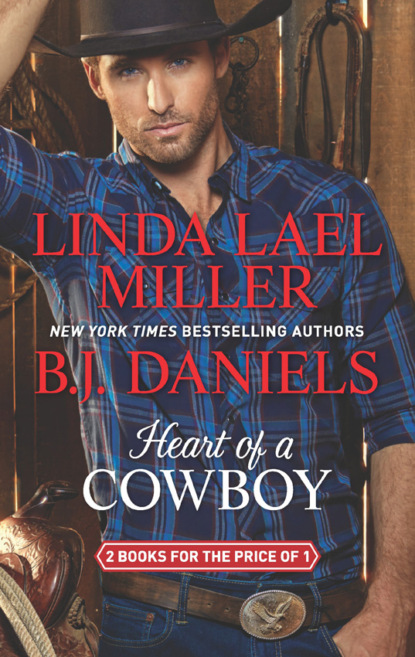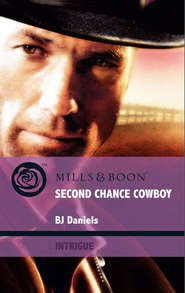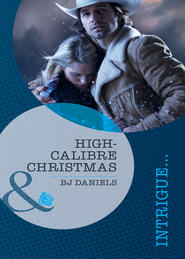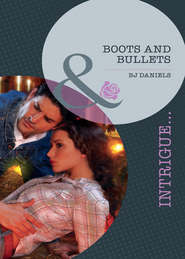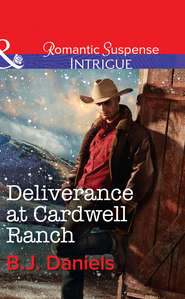По всем вопросам обращайтесь на: info@litportal.ru
(©) 2003-2024.
✖
Heart Of A Cowboy: Creed's Honor / Unforgiven
Настройки чтения
Размер шрифта
Высота строк
Поля
“I remember,” Conner answered.
They were nearing the barn by then. It was considerably newer than the house, built by the grandfather they’d never known, after he came home from the Vietnam War, full of shrapnel and silence.
He’d died young, Davis and Blue’s father, and their mother hadn’t lasted long after his passing. Now and then, in an unguarded moment, Conner caught himself wondering if he’d stayed single because so many members of the family had gone on before their time.
“You ever smile anymore?” Brody asked casually, as they dismounted in front of the barn. “Or say more than one or two words at a time?”
“I was thinking, that’s all,” Conner said.
“All the way up to five words,” Brody grinned. “I’m impressed, little brother. At this rate, you’re apt to talk a leg right off somebody.”
Conner led his horse inside, into a stall. There, he removed the gear and proceeded to rub the animal down with one of many old towels kept on hand for that purpose. “I don’t run on just to hear my head rattle,” he said, knowing Brody was in the stall across the aisle, tending to his own horse. “Unlike some people I could name.”
Brody laughed at that, a scraped-raw sound that caused the horse he was tending to startle briefly and toss its head. “You need a woman,” he proclaimed, as if a man could just order one online and have her delivered by UPS. “You’re turning into one of those salty old loners who talk to themselves, paper the cabin walls with pages ripped from some catalog, grow out their beards for the mice to nest in and use the same calendar over and over, figuring it’s never more than seven or eight days off.”
A grin twitched at Conner’s mouth at the images that came to mind—there were a few such hermits around Lonesome Bend—but he quelled it on general principle. “That was colorful,” he said, putting aside the towel and picking up a brush.
When Conner looked away from the horse he was grooming, he was a little startled to find Brody standing just on the other side of the stall door, watching him like he had a million things to say and couldn’t figure out how to phrase one of them.
Sadness shifted against Conner’s heart, but he was quick to dispense with that emotion, just as he had the grin.
“Sooner or later,” Brody said, sounding not just solemn, but almost mournful, “we’ve got to talk about what happened.”
“I vote ‘later,’” Conner replied, looking away.
“I’m not going anywhere, little brother,” Brody pressed quietly. “Not for any length of time, anyway. And that means you’re going to have to deal with me.”
“Here’s an idea,” Conner retorted briskly. “You stay here and manage the ranch for a decade, as I did, and I’ll follow the rodeo circuit and bed down with a different woman every night.”
Brody laughed, but it was a hoarse sound, a little raspy around the edges. “I hate to tell you this, cowboy, but you’re too damn old for the rodeo. That stagecoach already pulled out, sorry to say.”
The brothers were only thirty-three, but there was some truth in what Brody said. With the possible exceptions of team and calf roping, rodeo was a young man’s game. A very young man’s game, best given up, as Davis often said, before the bones got too brittle to mend after a spill.
Again, Conner felt that faint and familiar twinge of sorrow. He was careful not to glance in Brody’s direction as he made a pretense of checking the automatic waterer in that stall. The devices often got clogged with bits of grass, hay or even manure, and making sure they were clear was second nature.
“What now, Brody?” he asked, when a few beats had passed.
“I told you,” Brody answered, evidently in no hurry to move his carcass from in front of the stall door so Conner could get past him and go on into the house for that shower, the triple-decker sandwich and some beer. “I’m fixing to settle down right here on the ranch. Maybe build a house and a barn somewhere along the river one of these days.”
“There’s a big difference,” Conner said, facing Brody at long last, over that stall door, “between what you say you’re going to do and what you follow through on—big brother. So if it’s all the same to you, I won’t hold my breath while I’m waiting.”
Brody finally stepped back so Conner could get by him, and they both fell into the old routine of doing the usual barn chores, feeding the horses, switching some of the animals to other stalls so the empty ones could be mucked out.
“I meant it, Conner,” Brody said gruffly, and after a long time. “This place is home, and it’s time for me to buckle down and make something of the rest of my life.”
Surprised by the sincerity in his brother’s voice, Conner, in the process of pushing a wheelbarrow full of horse manure out to the pile in back of the barn, a fact that would strike him as ironic in a few moments, stopped and looked at the other man with narrowed eyes.
Brody’s gaze was clear, and he wasn’t smirking.
Conner almost got suckered in.
But then he reminded himself that this was Brody he was dealing with, a man who’d rather climb a tall tree to tell a lie than stand flat-footed on the ground and tell the truth.
“Brody?” he said.
“What?” Brody asked, a wary note in his voice.
“Go to hell,” Conner answered, wheeling away with the load of manure.
* * *
“YES!” SASHA CRIED, glowing and fairly jamming Tricia’s cell phone under her nose as she searched the commercial real-estate listings on the internet in her kitchen, hoping to discover that places like River’s Bend and the derelict drive-in theater were finally starting to sell again. “Mom and Dad landed in Paris without a problem, and they think it would be wonderful if you and I went horseback riding on the Creed ranch next Sunday!”
Discouraged—there were no properties like hers for sale online, it seemed—Tricia smiled nonetheless. Above their heads, a light rain began to patter softly against the roof, and twilight, it seemed to Tricia, was falling a little ahead of schedule. Valentino and Winston were curled up together on Valentino’s dog bed over in the corner, like the best of friends, snoozing away.
“Yep,” Tricia said, accepting the phone and reading the text message for herself. “That’s what it says, all right.” She felt resignation—she’d been hoping Diana would refuse to grant Sasha permission to ride strange horses—but there was also a little thrill of illicit anticipation at the prospect of spending time with Conner Creed.
Of course, it would have helped if she’d known the first thing about horses, and if the very thought of perching high off the rocky ground in some hard saddle didn’t scare her half to death. Sasha, perceptive beyond her tender years, rested a hand on Tricia’s arm and looked at her with knowing compassion. “You can do this, Aunt Tricia,” she said earnestly. “And I’ll be right there to take care of you, the whole time.”
Tricia’s heart turned over. The child was only ten, but she meant what she said—she’d do her best to keep Tricia safe. And that was way too much responsibility for one little girl to carry.
“I’ll be just fine,” Tricia assured Sasha, giving her a quick, one-armed hug.
Sasha’s attention had shifted to the computer monitor. “How are things in the real-estate business?” she asked, again sounding much older than she was.
Tricia sighed. “Not terrific, I’m afraid,” she replied.
“Dad says the economy is coming back, no thanks to the politicians,” Sasha told her. “He says he’s nonpartisan, but Mom says he doesn’t trust any elected official.”
Tricia smiled and pushed back her chair, being careful not to bump Sasha. Ten years old, and the kid was using words liked nonpartisan. There was no question that homeschooling worked in her case, but was she growing up too fast? Childhood was fleeting and, sure, knowledge was power and all that, but Tricia couldn’t help considering the possible trade-offs.
None of your business, she reminded herself silently, and turned up the wattage on her smile a little as she touched Sasha’s nose. “Let’s walk Valentino once more and then start supper.”
Sasha glanced at the window and gave a little shiver. “But it’s starting to rain,” she protested, not quite whining, but close.
“You’re from Seattle,” Tricia pointed out. “You won’t melt in a little rain.”
“But Valentino is sleeping,” Sasha reasoned, widening her eyes. “Maybe we shouldn’t disturb him. And if we go out, Winston will be all alone in the apartment.”
Tricia crossed to the kitchen door, took her jacket off one of the pegs and held Sasha’s out to her. “Winston,” she said, “will find ways to amuse himself while we’re gone.” Valentino awakened, apparently sensing that there was a walk in the offing, and stretched luxuriously. He went to Tricia, waited patiently for her to fasten the leash to his collar.
Sasha resigned herself to the task ahead and pulled on her coat. Her mind was like quicksilver, and she immediately backtracked to the Seattle reference Tricia had made earlier. “You’re from Seattle, too,” she said. “Are you ever coming back?”
“Yes,” Tricia answered, though there were times when she wondered if she’d ever get out of Lonesome Bend. It wasn’t just the properties her dad had left her—she’d made a lot of friends in town and, besides, the thought of leaving Natty alone in that big house bothered her.
They stepped out onto the landing and found themselves in a misty drizzle and a crisp breeze. It wasn’t quite dark, but the streetlights had already come on, and a car splashed by, the driver tooting the horn in jaunty greeting.
Busy descending the outside stairs, Tricia and Sasha both took a moment to wave in response.





